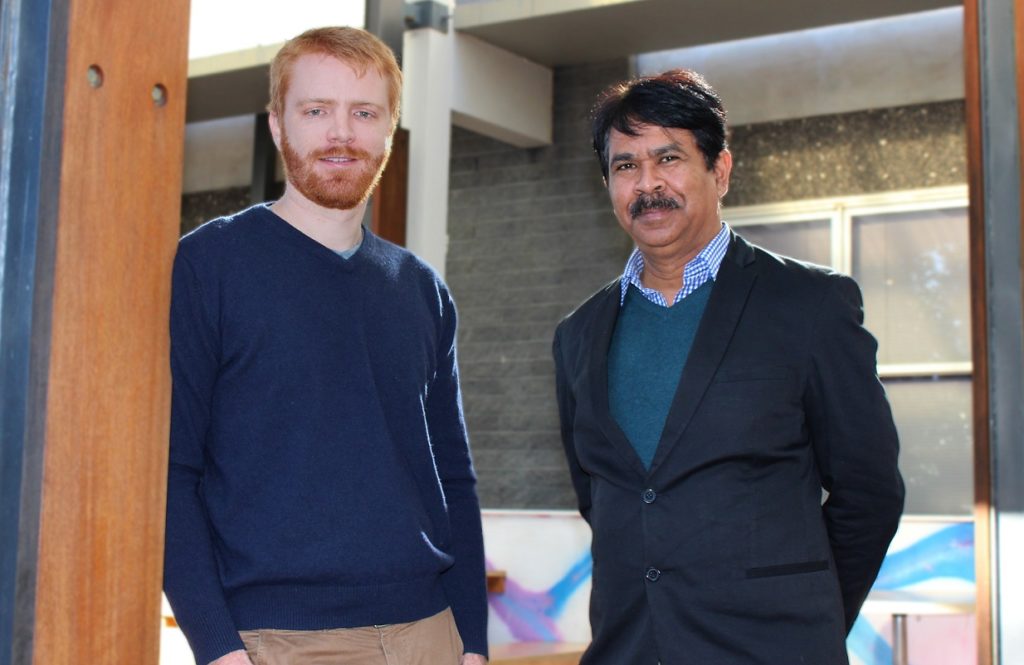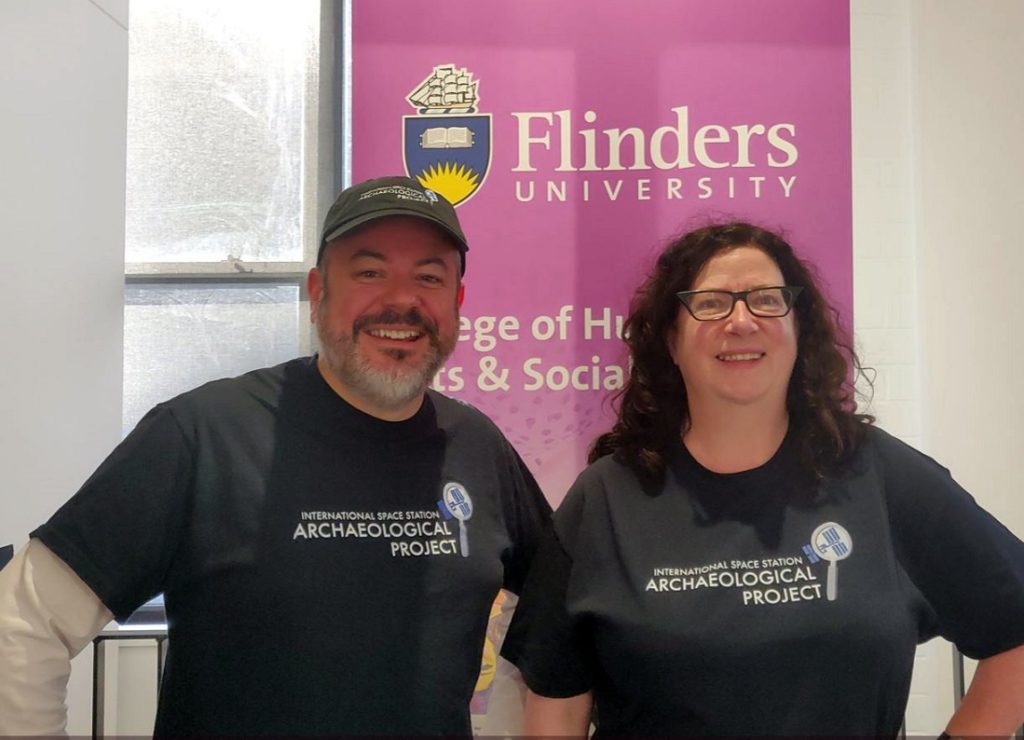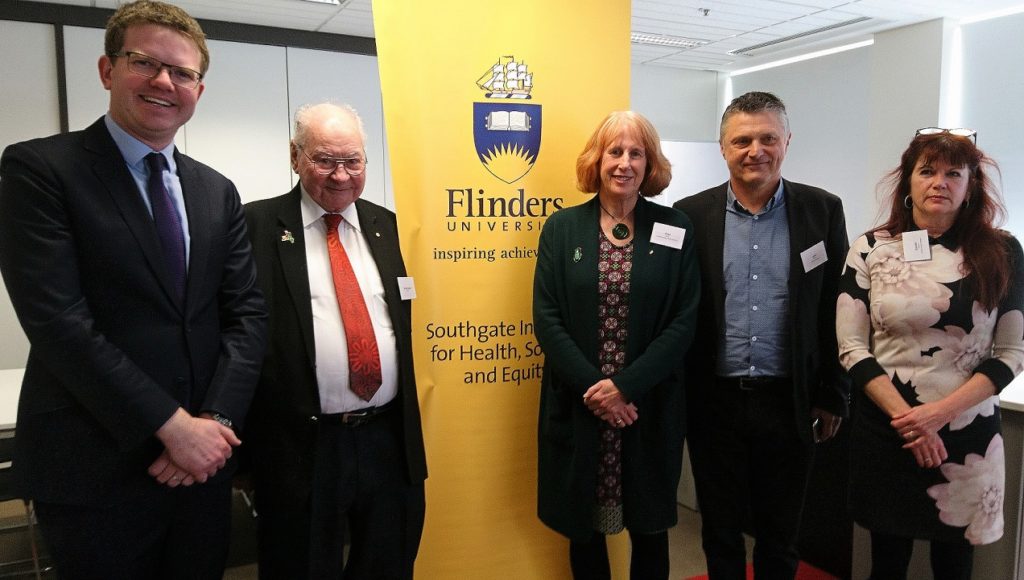
The inimitable Dr Alice Gorman hosts a visiting US archaeology expert at the start of a new ARC-funded collection, Flinders grad dip student beats masters from around the nation to take out population prize, and Southgate concludes a three-year wellbeing project with a multi-sector policy forum.
Grad Dip student takes out top population award

Postgraduate student Jack Luxton has been awarded the 2018 Borrie Prize in the Masters/Honours category. This extremely competitive prize is awarded by the Australian Population Association (APA) each year for the best paper in demography/population studies (Masters/Honours category) in Australian universities.
Mr Luxton is completing a Graduate Diploma in Environmental Management and was up against Masters students to take out the award, which comes with a cash prize.
His paper, ‘Environmental Consequences of Ageing Populations – A Case Study of UK’ explores the way environmental impact changes due to different behaviours between age groups, linking to ageing demographics in developed countries that are expected to increase, and what changes this could bring to overall environmental impact predictions.
His review of the literature found a shift in the way people use resources as they age, resulting in more intense environmental impact in some areas such as household electricity, and less in others. Mr Luxton highlighted his findings through a case study based on UK data that modelled age structure to understand the influence on future environmental impact. Importantly, he noted that overall environmental impacts of an ageing population are likely to depend on location-specific characteristics as well as pollution-reduction mechanisms that are in place.
Further investigation and consideration of these factors is important to shape future policy decisions.
The paper was originally submitted as an assignment in the Population and Environment topic taught by Associate Professor Udoy Saikia.
“I was so impressed by the quality of the paper I requested him to submit it for the APA competition,” Associate Professor Saikia says.
The judges’ report stated “Overall, this is a solid piece of work at a Masters level and a well written paper. Congratulations!”
Fly me to the moon

The inimitable Dr Alice Gorman is hosting a special visit by a US archaeology expert at the start of a new ARC-funded collection of the 20-year history of the International Space Station.
Associate Professor Justin Walsh, an archaeology and culture expert from Chapman University, is at Flinders this month to work on the world’s first ISS database, as part of an ARC Discovery grant aimed at recording the various stages of development and discovery by the ISS and the legacy it leaves.
Using information from NASA, the ARC ISS project seeks to create a picture of how human communities survive for long periods in space.
Ahead of the 50-year anniversary of the first moon landing, on 21 July, Dr Gorman has joined a galaxy of special events, including a panel discussion at the Canberra Moon Week and a futuristic Radio National discussion with Chief Scientist Dr Alan Finkel.
Supporting the recent release of her book, Dr Space Junk vs The Universe: Archaeology and the Future (UNSW Press), Dr Gorman is also presenting with other science and technology experts at the international Manchester Bluedot Festival
Dr Gorman’s new book is available from Dymocks, Imprints, Australian Geographic, QBD, the Coop and other outlets and a digital edition is being planned. She also plans to talk on her research and new book at the Byron Bay Arts Festival in early August.
Southgate forum finalises three-year project
The Southgate Institute held its final forum for its three-year ARC project, Maximising the value of public policy for population wellbeing, on 26 June 2019, attracting policy and advocacy leaders to explore the diversity of factors that shape health.
The event examined how policy in the justice, urban planning, environment and energy sectors facilitate or obstruct action on social determinants of health and health equity.
Presentations highlighted the large gap between policy development and policy implementation, tensions between collective population policy responses and individualism, and challenges in bringing about change to improve population well-being and health equity.
Opened by the Honourable Chris Picton MP, Shadow Minister for Health and Wellbeing, initial presentations were given by Professor Fran Baum, Director of the Southgate Institute and Carmel Williams from the Department for Health and Wellbeing, followed by talks and panel discussions sharing the input of a variety of sectors, represented by:
- Professor Dennis McDermott, La Trobe University and Dr Meng Evans, intern at SA Health, on the justice sector
- Professor Colin MacDougall, Flinders University on the energy sector
- Professor Dora Marinova, Curtin University on the environment sector
- Dr Michael McGreevy, Southgate Institute on urban planning
Panel members included representatives from advocacy, non-government, academic and government organisations, including the Hon Mark Butler MP Shadow Minister for Climate Change and Energy, John Rawnsley from the Northern Australian Aboriginal Justice Agency, Professor Ian Lowe from Griffith University, Fiona Armstrong from Climate & Health Alliance, Louise Kelly from OARS Community Transitions and Mark Henley from Uniting Communities.
More than 90 people attended with many others viewing it via live streaming.


